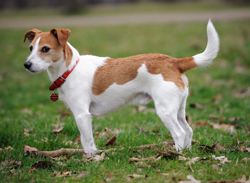Parson Russell Terriers are small dogs with a weatherproof coat that can be smooth or broken. The coat comes in white, tri-color, or white with black or tan marks, and it is naturally harsh, dense, and straight. Grizzle is acceptable, but brindle is not. The undercoat is short and dense. These dogs have flat and broad heads, rectangular muzzles, dark eyes, and V-shaped drop ears. Parson Russell Terriers measure 13 to 14 inches tall at the shoulder and weigh 13 to 17 pounds.
These dogs are playful and affectionate at home, while remaining courageous and tenacious at work.
This breed is friendly, outgoing, and affectionate, which makes it an excellent choice for families with older children. Parson Russell Terriers are also very energetic and require regular exercise and plenty of attention and mental stimulation. These dogs prefer not be left alone.
The Parson Russell Terrier has received a lot of media exposure in recent years, making it a popular pet and a pop culture icon.
Alert, bold, friendly, and clever, the Parson Russell Terrier makes a great family companion. These dogs are playful and affectionate at home, while remaining courageous and tenacious at work. They are full of life, outgoing, and fiercely protective of their home and family. With a little training, they are ideal pets.
Parson Russell Terriers typically have a clownish side and enjoy entertaining those around them. They also like adventure and mischief and frequently find themselves in trouble because of it. Exploring, wandering, chasing, and digging provide much needed mental and physical stimulation.
These dogs require a lot of physical activity and they need to spend time outdoors. They are not a good fit for city apartments. A long walk and vigorous play session are important every day. If Parson Russell Terriers spend any time outdoors without supervision, they should be contained in a securely fenced yard to prevent wandering.
Parson Russell Terriers are a generally healthy breed, but this does not guarantee that any individual dog will be free of genetic disorders or other health problems. Adopting or purchasing one of these dogs from a reputable source is the best way to ensure good health and a long life.
Common health problems in the breed include dislocated kneecaps, Legg-Perthes disease, joint problems, deafness, and compulsive behavior. Ataxia is another concern, and these dogs are known to be at increased risk for a number of eye conditions, including lens luxation and glaucoma. Eye and knee tests early in life can help diagnose these conditions early for a better prognosis.
With routine veterinary care, daily exercise, a healthy diet, and standard canine vaccinations, Parson Russell Terriers can live a full life of up to 15 years.
Parson Russell Terriers are curious and energetic dogs, but they are mostly well behaved. Early training combined with regular activity will go a long way toward preventing any negative behaviors from developing. These dogs have a tendency to dig and bark, however, and this should be dealt with during puppyhood, before the behaviors are difficult to correct.
Positive reinforcement works well with this breed, especially when play and praise rewards are used. Training sessions should be kept short and fun to hold the breed's attention and prevent resistant.
Although this breed is better than most terriers when it comes to socialization, Parson Russell Terriers may still instigate fights with unfamiliar dogs for no obvious reason. Additionally, these dogs are likely to chase any rabbits, cats, or rodents encountered while outside or on a walk.
Whether they have a smooth or broken coat, Parson Russell Terriers are easy to groom. Both coat types require brushing a couple times each week, and the broken coat needs occasional hand stripping.
This is a clean breed that rarely needs bathing. However, if bathing becomes necessary because the breed rolls around in something stinky, sticky, or harmful, a pH-balanced canine shampoo will do the trick without irritating the skin. After bathing, these dogs should be rinsed and dried thoroughly.
The nails need trimming every week or two to prevent painful snags and breaks, and the teeth should be brushed every day to ensure healthy teeth and gums. Weekly grooming sessions to clean and check the ears are also important. Signs of infection or excess ear wax accumulation should be reported to a veterinarian right away.
Parson Russell Terriers are named for the highly respected huntsman, Rev. John Russell. They were developed in the south of England during the mid-1800s to hunt red fox both above and below ground.
The dogs were very skilled at hunting, and they would run along with horse and hound to trail horses through the countryside.
Today, these dogs can be found exhibiting at obedience and agility trials and working in stables. They are also popular companion animals in the United States.
The American Kennel Club officially recognized the Parson Russell Terrier in 1997.

